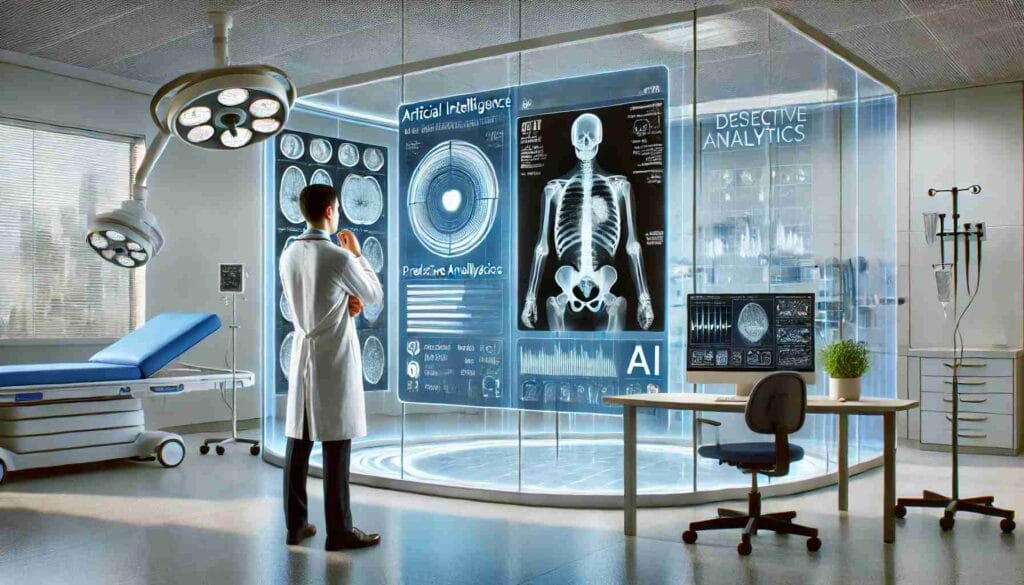The Role of AI in Disease Diagnosis

Artificial Intelligence (AI) has become one of the most transformative technologies in healthcare. Its applications are vast and continue to evolve rapidly. One of the most critical areas where AI is making a significant impact is in disease diagnosis. By leveraging machine learning algorithms, deep learning models, and large datasets, AI is enhancing the accuracy, speed, and efficiency of disease identification. This article explores how AI is revolutionizing the diagnostic process, its current applications, challenges, and future prospects.
AI in Early Diagnosis
Early detection of diseases plays a crucial role in improving treatment outcomes and reducing mortality rates. Traditionally, diagnosing diseases like cancer, heart disease, and neurological disorders often requires extensive tests and procedures, many of which are invasive. AI, however, is making it possible to identify certain conditions at their earliest stages through non-invasive methods. Machine learning models can analyze medical imaging, such as X-rays, MRIs, and CT scans, to detect anomalies that might be missed by human clinicians. This early detection allows for timely intervention, increasing the chances of successful treatment.
For example, in oncology, AI-powered diagnostic tools have shown great promise in detecting breast cancer, lung cancer, and skin cancer at their earliest and most treatable stages. By training on vast datasets of medical images, these AI models can recognize subtle patterns in images that may not be visible to the human eye.
AI in Imaging and Radiology
Medical imaging is one of the most widely recognized applications of AI in disease diagnosis. Radiologists often rely on imaging technologies like MRI, CT scans, and X-rays to diagnose conditions, but the process can be time-consuming and prone to errors. AI has revolutionized this aspect of healthcare by significantly improving the accuracy and speed of image interpretation.
AI systems use deep learning algorithms to analyze medical images and identify abnormalities such as tumors, fractures, or signs of disease. These systems can also assist radiologists in prioritizing cases, ensuring that urgent diagnoses are made faster. Studies have shown that AI models can outperform human doctors in certain diagnostic tasks, particularly in identifying and classifying various diseases in medical images.
AI in Genomics and Personalized Medicine
Another exciting application of AI is in the field of genomics, where AI is being used to analyze genetic data to understand the underlying causes of diseases. By analyzing vast amounts of genetic information, AI can help identify genetic mutations and predict the likelihood of developing certain diseases. This is particularly important in the field of personalized medicine, where treatments are tailored to an individual’s genetic makeup.
AI can also help in identifying potential drug candidates and predicting how different individuals will respond to specific treatments based on their genetic profile. This personalized approach holds the promise of more effective treatments with fewer side effects.
AI in Predictive Analytics and Early Warning Systems
In addition to diagnosis, AI is playing a crucial role in predictive analytics. By analyzing large datasets from various sources, including patient records, medical histories, and even environmental factors, AI can predict the likelihood of a patient developing certain conditions in the future. For instance, AI models can identify patients at high risk of developing heart disease or diabetes based on patterns in their health data, enabling early intervention before the disease fully manifests.
AI-powered early warning systems can also be used in hospitals and healthcare settings to monitor patients in real-time. These systems continuously analyze patient vital signs and other health metrics, alerting healthcare providers if any abnormalities are detected, allowing for prompt action and reducing the risk of complications.
Challenges and Ethical Considerations
While the potential of AI in disease diagnosis is immense, there are also significant challenges that must be addressed. One of the primary concerns is the need for high-quality, annotated medical data to train AI models. Obtaining such data is often time-consuming and costly, and there are concerns about data privacy and security, especially when dealing with sensitive patient information.
Another challenge is the risk of AI systems making errors in diagnosis, which could lead to misdiagnosis or delayed treatment. AI should be seen as an assistive tool rather than a replacement for human clinicians. It is crucial that AI systems are used alongside, rather than instead of, human judgment. Proper regulatory frameworks are needed to ensure that AI systems are reliable, transparent, and accountable.
Additionally, there are ethical concerns regarding the use of AI in healthcare, including issues related to bias in AI models and the potential for exacerbating healthcare inequalities. AI models must be carefully designed to ensure that they do not perpetuate existing biases in healthcare and that they are accessible to all populations.
The Future of AI in Disease Diagnosis
The future of AI in disease diagnosis looks promising. As AI technologies continue to advance, we can expect even more sophisticated diagnostic tools that are faster, more accurate, and capable of identifying a broader range of diseases. AI is also likely to become more integrated into clinical workflows, making it an essential tool for healthcare providers worldwide.
With the ongoing development of AI in areas like genomics, personalized medicine, and predictive analytics, the healthcare industry is moving towards a future where diseases are detected earlier, treated more effectively, and managed more efficiently.
In conclusion, AI is transforming the way diseases are diagnosed, enabling faster and more accurate detection, as well as personalized treatment options. While there are challenges to overcome, the potential benefits for patients and healthcare providers are enormous. The continued integration of AI into healthcare holds the promise of improving global health outcomes and revolutionizing the practice of medicine.
Source : Medium.com




